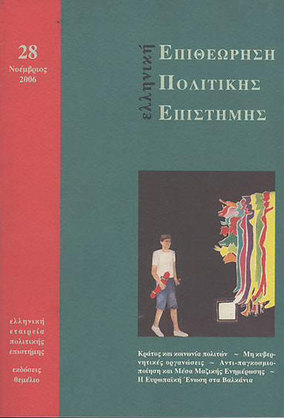Κομματικό σύστημα και πολιτικός ανταγωνισμός στην Ελλάδα, 1981-2001
Part of : Ελληνική Επιθεώρηση Πολιτικής Επιστήμης ; No.17, 2001, pages 71-102
Issue:
Pages:
71-102
Parallel Title:
Party system and political competition in Greece, 1981-2001
Section Title:
Αφιέρωμα στις εκλογές 2000
Author:
Abstract:
This paper seeks to revise the hitherto prevalent perception that the party system established in Greece after the breakdown of dictatorship is characterized by, first, continuity from the pre-1967 period, and, second, limited but polarized pluralism. The new claim is that the party system that was shaped particularly after the critical 1981 elections is an entirely new one, which, moreover, serves as a paradigmatic case of (non-polarized) two-par- tyism. The first part of the article develops around a critical assessment of the established perceptions at three distinct levels - empirical, theoretical and methodological. The second part includes a counting of the relevant political parties utilizing, but also further building upon Sartori’s “counting rules.” This exercise yields only two significant political parties, PASOK and ND, which supports the initial hypothesis of a two-party system. In the third part, the discussion shifts on the characteristics of political competition in such a two-party system. Among the major findings is the significant and continuous decline of political polarization in modem Greek politics, which becomes evident especially in three areas: (a) the convergence of the two relevant parties in both ideological stance and proposed policies; (b) the contraction of the ideological competition space; and (c) the voters’ attitudes, which are becoming increasingly non-participatory, and characterized by lack of interest in current political affairs and growing cynicism.
Subject:
Subject (LC):
Keywords:
κόμματα, Ελλάς
Notes:
Περιέχει βιβλιογραφία, πίνακες και διαγράμματα




